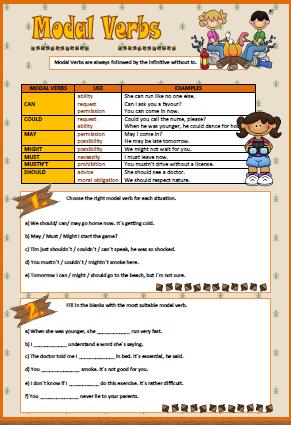

‘I’d recommended that you take the jumper back to the shop.’ → She said (that) I should/ought to take the jumper back to the shop.‘I’ll be disappointed if I don’t get the job.’ → She said (that) she would/will be disappointed if she didn’t/doesn’t get the job.‘You should have used brighter wallpaper for the bedroom.’ → She said (that) I should have/ought to have used brighter wallpaper for the bedroom.‘It’s possible that I’ll have to leave early.’ → She said (that) she may/might have to leave early.‘My advice is to look for a new job now.’ → She said (that) I should/ought to look for a new job now.‘It’s important for you to be at the theatre on time.’ → She said that I had to/ must be at the theatre on time.Use an appropriate modal verb in that-clause. Report what was said using a sentence with a that-clause. Modal Verbs In Reported Speech Exercises with Answers ‘You mustn’t tell my brother.’ → He warned me that I mustn’t tell his brother.If mustn’t is used in the original, we can use mustn’t in the report but not didn’t have to: I must be getting old.’ → Neil said he must be getting old. However, when must is used in the original to conclude that something (has) happened or that something is true, then we must, not had to, in the report: ‘You must be home by 9 o’clock’ → she said I must/had to be home by 9 o’clock.When must is used in the original to say that it is necessary to do something, we can usually use either must or had to in the report, although must is less common:



Will or would, can or could, may or might (existing or future situations and past tense verb in reporting clause) Will, can, may (existing or future situations and present tense verb in reporting clause) modal verb in originalĬould, would, should, might, ought to, used to The changes are summarised in below table. When there is a modal verb in the original statement, suggestion, etc., this sometimes changes when we report what was said.
#MODAL VERBS EXERCISES PDF PDF#
Modal Verbs In Reported Speech Exercises – Modals Exercises PDF


 0 kommentar(er)
0 kommentar(er)
